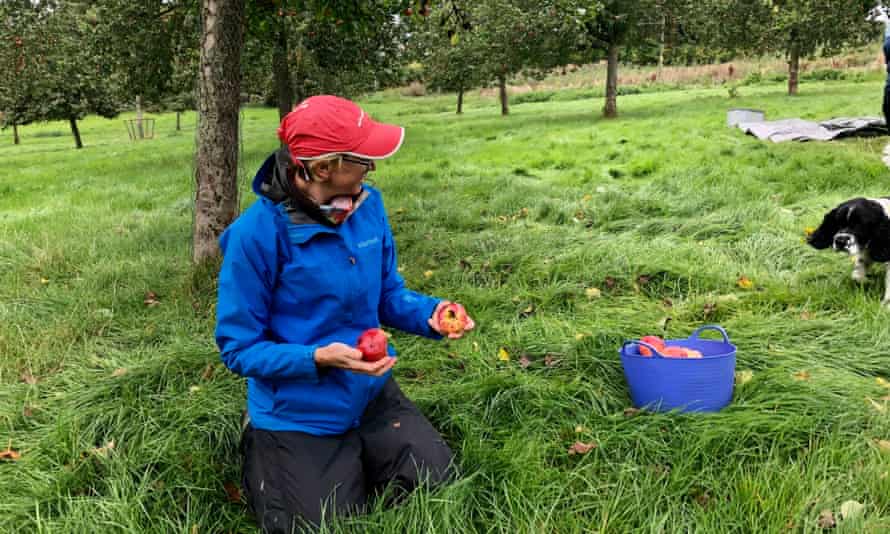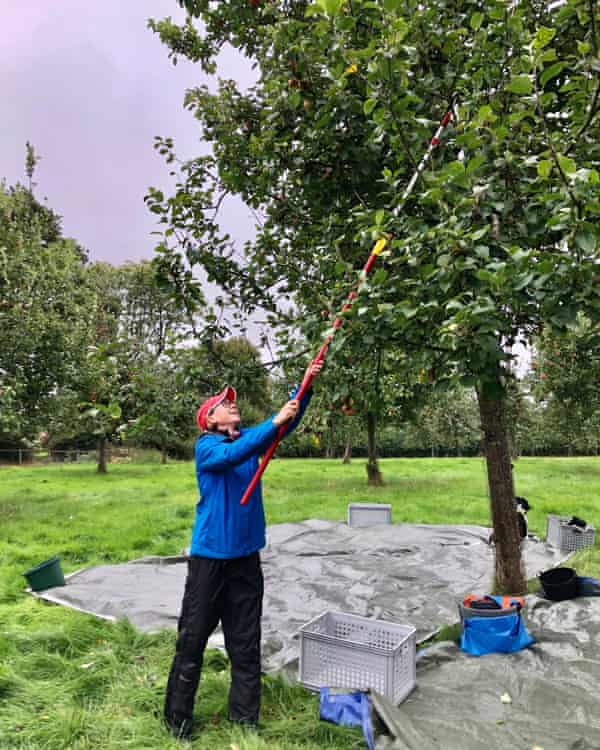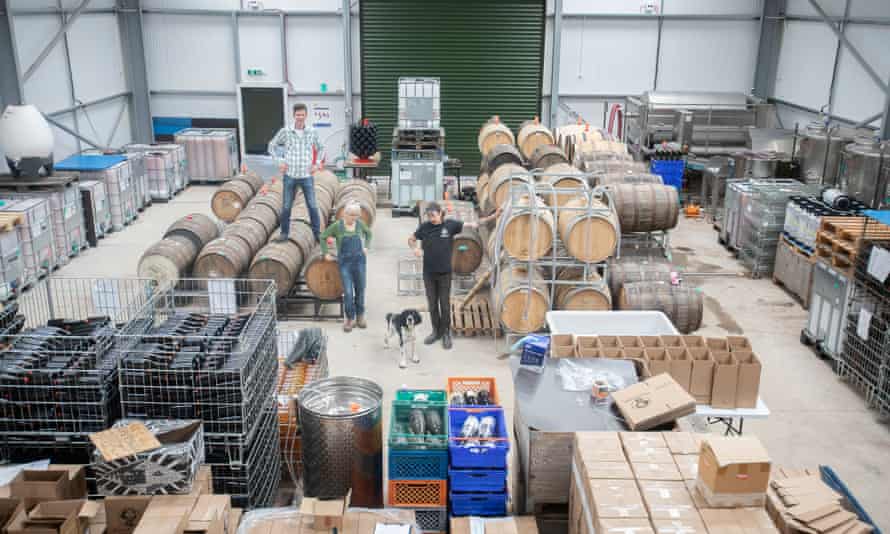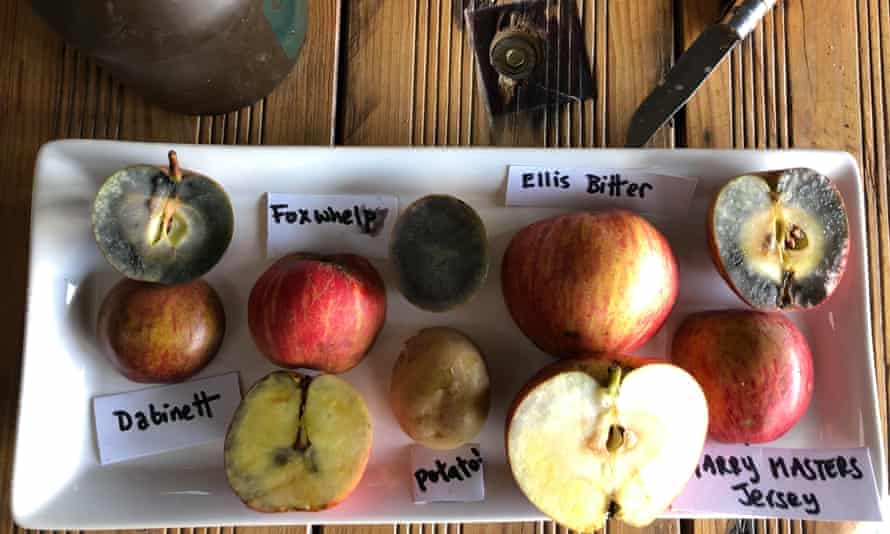The first rule of cider-making? The fruit is always in charge. That’s what Susanna Forbes tells me as we look out from her kitchen to windswept trees and moody skies. When apples are ready they must be picked. But are there, I ask – pulling on waterproofs and wellies – any conditions in which you just wouldn’t? “A deluge,” she says, “for reasons of practicality and sanity. Though if it was a really special tree…”
This early October day is merely damp, and there’s certainly not enough of a deluge to defy Mother Nature. Plus I’m not here to chat over coffee, as lovely as that might be (Susanna is warm, expert and engaging). No, I’ve joined the co-founder of craft cider and perry pioneer Little Pomona to lend a hand.
Gentle, rolling, rural Herefordshire is synonymous with cider apples. It produces about 150,000 tonnes each year. While big commercial producers will come in with their machines and scoop up everything at once – good apples, bad apples, assorted orchard flotsam – artisanal producers such as Little Pomona are literally more picky. They harvest only the best fruit, at just the right time, which will vary not just by field but by variety, tree and even the side of the tree. This results in end products that are akin to wine in their quality and complexity. But this takes more skill and person-power. Which is where people like me come in.

Several artisanal cider producers welcome volunteers over the busy autumn months to assist with whatever needs doing: picking, shovelling, pressing, bottling.
“You don’t always know what’s going to happen. It may be as unglamorous as cleaning or working the pump, but volunteers are right in it,” says Susanna. Also, these are small businesses where extra help isn’t just handy but vital.
“It means we can move on,” says Susanna. With volunteers doing the basics, there’s more time for her and husband, James, to scout different orchards, find exciting fruit and create interesting blends.
And what’s in it for the volunteers? Susanna explains: “Some come for a break, to share the mindful process of being outside. Others are interested in getting into cider.”

Susanna herself volunteered at the nearby Ross on Wye Cider & Perry company in 2013 before launching Little Pomona a year later.
I have no such career-change aspirations, but I like the idea of getting away from my desk, doing something physical and feeling useful, in soothing countryside. Which is how, like many of Little Pomona’s short-term volunteers, I come to be staying in the Forbes’s wood-beamed spare room (which dates back to about the 15th century). And which is why I’m crawling about their traditionally planted home orchard with fellow volunteer Helen and Joey the dog, treasure-hunting in the wet shag-pile grass for windfall Ellis Bitters, trying to assess whether they’re fit for purpose. Fortunately, this isn’t too hard: scabby and ugly is fine; bruised isn’t (“they can’t retain the aromatics”); those with wildlife burrowed inside are definite nos. It’s rather therapeutic, eyes and fingers focused on the earth, mind free to roam and natter. And it’s oddly addictive; just when you think you’ve de-appled an area, you spot another. But eventually it’s time to bring out the panking pole.
Having laid tarpaulins under the tree, Susanna hands me an extendable hooked stick, which is used to shake the higher branches. The trick, she explains, is being aggressive enough to make the fruit fall but not so much that you destroy next year’s shoots. Or get bonked on the head, Isaac Newton-style. I give it a go, standing at a safe angle and causing a volley of apples to smack the ground. I keep going. Soon my arms ache and the tree empties; occasionally I land a hole in one, an apple falling straight into the bucket below. “Always satisfying,” Susanna admits.

We collect around 200kg, which I tow back to the house, having been entrusted with the sit-on mower. Little Pomona used to be based here, at Susanna and James’s home, but they now have a larger modern cidery a few miles away, at Brook House Farm near Bromyard. Which is where we’re off to next. There are, says Susanna, interesting things going on.
One of those things is a top-secret cherry perry project. The mixed juice has been fermenting for a while and is now ready to be transferred into barrels (two cognac, one rum). As everything here is naturally fermented, with nothing extra added, the skill is in deciding how best to blend different varieties using different vessels. I help, after a fashion, holding tubes and tilting carboys of golden juice as James masterminds the magic.
There are plenty of other tasks. I assemble flatpacked cardboard boxes and polish dusty bottles so they’re ready for the labelling machine. I use that too, though not with great success – if you happen to buy a double-labelled bottle of juicy Old Man & the Bee 2019, that’s one of mine…

Later on, with Susanna and Helen busy with customers in the tasting room, I join James on a scouting mission to nearby Netherwood Estate. Little Pomona works with several orchards and will check them periodically, tagging any trees they want to harvest. Today, it’s slim pickings, but I get to taste a beautiful Brown’s, zingy as Starburst, and a rare White Norman, which looks like a little egg. It was the latter variety that James used as the mainstay of his 2018 Netherwood Reserve Cider, made especially for the estate and served at its Michelin-starred restaurant, Pensons. We pop in on our way past.
“We’ve sold so much of the cider,” says manager Jim Conway. “It’s got soft tannins and oak, but still a freshness. It goes well with our duck but works with a lot of different things; it’s super-versatile.”
I’d love to dine at Pensons some time. I’d especially like to try the signature cocktail, a mix of calvados, orange and the Netherwood Reserve. But tonight I’m happy to end up back in the Forbes’s kitchen. Homemade curry bubbles on the stove, James plays vinyl, Joey spread-eagles on the sofa, cider is popped, poured and pored over. And we make vague plans for tomorrow – more picking, more cleaning, collecting a stack of perry pears – but ultimately the fruit will have the final say.
Little Pomona Cider House is near Bromyard, Herefordshire; the shop is open Saturdays, noon to 3pm, year round; the tasting room is open Thursdays and Saturdays from April to September (tours available on Saturdays); three-day volunteering opportunities (Monday-Wednesday) run throughout October and November; team meals included. Contact Susanna Forbes, susanna@littlepomona.com, littlepomona.com

Help with the Herefordshire harvest: other places to volunteer
Ross on Wye Cider & Perry
This internationally renowned producer has a long history of welcoming volunteers, including Susanna. Volunteers can camp or stay at the farm’s Cider Shack.
Contact Albert Johnson, info@rosscider.com; rosscider.com
Innocent Pilgrim
Volunteers at this smaller, certified-organic producer near Leominster are likely to be involved with a bit of everything. Accommodation is in a yurt on the smallholding.
Contact Russell Sutcliffe, russell@innocentpilgrim.co.uk, innocentpilgrim.co.uk
Ragged Stone
This award-winning cidery has accepted volunteers for years, some through the Wwoof (Worldwide Opportunities on Organic Farms) scheme. It straddles county borders, picking from orchards in Herefordshire and beyond, with a taproom at the Perry Pear Centre in Gloucestershire.
Contact Chris Atkins, chris@catkins.org; on Facebook
Museum of Cider
Help out at the UK’s only accredited cider museum, in Hereford. Duties might include photographing the bottle collection or harvesting at one of the museum’s orchards.
Contact Elizabeth Pimblett, director@cidermuseum.co.uk, cidermuseum.co.uk
 Top Naija News – Nigeria News, Nigerian News & Top Stories Top Naija News – Nigerian Newspapers, Nigerian News. topnaijanews is a daily Nigerian newspaper covering Latest News, Breaking News, Entertainment, Sports, Lifestyle and Politics.
Top Naija News – Nigeria News, Nigerian News & Top Stories Top Naija News – Nigerian Newspapers, Nigerian News. topnaijanews is a daily Nigerian newspaper covering Latest News, Breaking News, Entertainment, Sports, Lifestyle and Politics.



